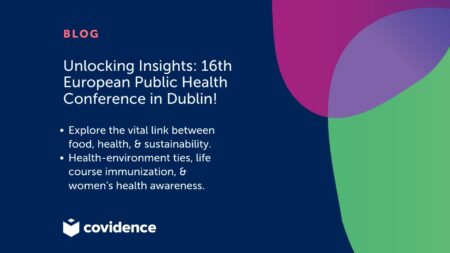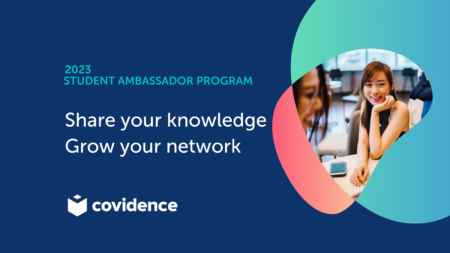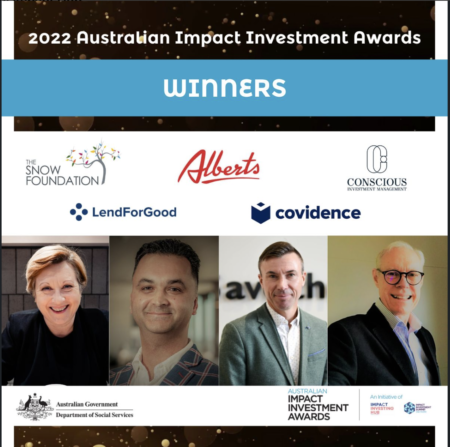The ripple effect of the Covidence Global Scholarship program
In 2022 the Covidence Global Scholarship program supported 52 students whose work is making a difference to evidence-based practice and policy around the world. We caught up with some of them to hear about the effects that their research is having on those around them.
The success stories of the scholarship recipients beyond the classroom demonstrate the program’s positive impact on learning and practice. From Ethiopia to Australia and South Africa, the scholarship has provided opportunities for researchers to conduct systematic reviews, analyze data, and collaborate with experts. Covidence caught up with some of the winners, who shared their experiences to date. Here are four ways that their work has created a ripple effect across their fields of research.

1. Filling knowledge gaps
First, the scholarship recipients are not only pursuing their research goals, but they are also making a positive impact on public health by narrowing the knowledge gap. They are contributing towards the formulation of evidence-based policies and clinical practice guidelines. These policies will ultimately improve the health outcomes of individuals and communities worldwide.
Bereket Gebremichael, a scholarship recipient from Ethiopia, is pursuing his PhD in Nutrition and Health, specializing in nutrition epidemiology at the University of Adelaide. His research aims to examine the effect of decreased caloric intake during the prenatal period on maternal and child health outcomes. Bereket believes that his research will have a significant contribution in narrowing the knowledge gap in nutrition and public health and will be instrumental in the formulation of public health policy and clinical practice guidelines. He says “the most fascinating part of my research so far is reading a lot about the scientific debates in my research area and being able to identify the gaps that need to be filled”.

2. Promoting public health
Evidently, the scholarship winners’ research findings can influence risk mitigation policies, planning, and clinical practice which can recreate the public health system as a whole. Aatik Arsh, a scholarship recipient, conducted a systematic review related to the effects of physical activity on depression in people with diabetes, and the findings will have implications for society as a whole. Aatik plans to promote the concept of physical activity prescription for the management of depression in his home country Pakistan.
Mojgan Amiri is based at the Erasmus Medical Center in The Netherlands. She is investigating the association of circulation Lipoprotein(a) (Lp(a)) and risk of all-cause and cause-specific mortality in the general population and patients with chronic diseases. Her study provides evidence that higher Lp(a) levels are associated with higher risk of all-cause mortality and CVD-death in the general population and in patients with CVD. Mojgan says, “These findings support the ESC/EAS Guidelines that recommend Lp(a) should be measured at least once in each adult person’s lifetime, since our study suggests those with higher Lp(a) might also have higher risk of mortality”.
3. Pursuing future goals
Fahmida Saadia Rahman from Bangladesh is pursuing her PhD in Economics at Western Sydney University, Australia. Her research work will use various digital platforms to translate research findings into behaviour change. She hopes that her findings will influence risk mitigation policies and planning for different stakeholders.
Sarah Jacobs, a PhD candidate in psychiatric genetics at the neuroscience institute of the University of Cape Town in South Africa, is primarily focused on genetic disorders such as epilepsy and psychogenic non-epileptic seizures in African populations. She says that “I think the most interesting part of my research so far is learning about bioinformatics…understanding how to code and run scripts in various programs to analyze huge chunks of data has been quite interesting, I look forward to more learning.” As there is currently limited research in this area, Sarah hopes that her study will contribute towards understanding the genetic bases of seizure disorders within African samples.
I think the most interesting part of my research so far is learning about bioinformatics…understanding how to code and run scripts in various programs to analyze huge chunks of data has been quite interesting, I look forward to more learning.
Sarah Jacobs, PhD candidate, University of Cape Town
4. Giving back to the community
The scholarship recipients are not only focused on their own research goals but are also dedicated to giving back to their communities. For example, Aatik’s plans to promote the concept of physical activity prescription for the management of depression will bring this evidence-based practice to the people who could benefit from it. Mojgan is planning to give back to her community and field with the knowledge and skills she gained through her study program. She has also collaborated with experts in dose-response analysis, providing her with a great opportunity for international collaboration and an opportunity to make her own contribution.
In conclusion, it is wonderful to see the positive impact of this program on so many people and across diverse areas of research. We are inspired by their hard work and commitment and we wish all the scholarship recipients continued success in their efforts to champion evidence-based practice.



